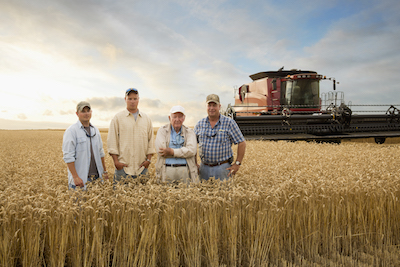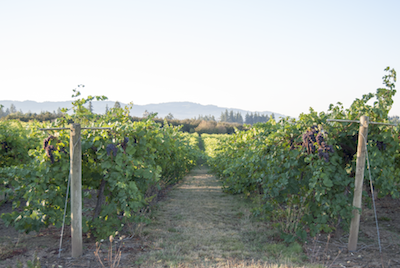
There have been recent changes to the owner and immediate family exemption under the 2015 Worker Protection Standard. They went into effect on January 2, 2017.
First, be aware:
- There is no WPS exemption for 'family farms' in their entirety;
- The 'agricultural establishment' itself is NOT exempt from the WPS requirements;
- This exemption only covers the establishment owner(s) and their immediate family members;
- There is no owner/immediate family exemption for commercial pesticide handling establishments;
- No agricultural establishments that uses WPS-covered pesticides are completely exempt from WPS requirements;
- Even owners and their immediate family members that qualify for the exemption must comply with certain WPS requirements;
- Owners of agricultural establishments must still provide ALL of the required WPS protections for anyone on the establishment that is not an immediate family member.
Is your agricultural establishment eligible for the exemption?
If a majority of the establishment (more that 50% of the equity) is owned by one or more members of the same immediate family, then a smaller set of WPS requirements apply to all of the owners and their immediate family members.
Cousins Chuck and Evelyn own and operate the family farm, and their kids manage different parts of the operation. The establishment qualifies for some exemptions, but they only apply to Chuck, Evelyn, and their immediate family members.
A Christmas tree farm is owned in three equal parts by Joe, Dan, and Debbie. Dan and Debbie are married; Joe is a family friend. The establishment qualifies for some exemptions, but they only apply to Joe, Dan, Debbie and their immediate family members.
What? The exemptions apply to Joe, too? Joe is an owner of an agricultural establishment that is 66.6% family-owned. That means the exemption applies to him too, and his immediate family members.
A cranberry operation is owned by a corporation and is operated by Jane and Bill, who are siblings. The establishment does not qualify for any exemptions for Bill and/or Jane's immediate family. They are not owners.
However, if the owner leases or rents the property to someone else, leaving all management and profit/risk to the renters, those renters/lessors would be the "owners."
Betsy owns a piece of property that she rents to John and Nick, two brothers that lease the land and run a vegetable seed farming operation. Betsy doesn't have any part in the management of the operation, and she is not affected by its profit or loss. In this case, John and Nick are the "owners" for the purpose of the WPS. Some exemptions would apply to John and Nick and their immediate family members.

Who qualifies as 'Immediate Family'?
Immediate family includes: spouses, parents, step-parents, foster parents, fathers-in-law, mothers-in-law, children, step-children, foster children, sons-in-law, daughters-in-law, grandparents, grandchildren, brothers, sisters, brothers-in-law, sisters-in-law, aunts, uncles, nieces, nephews, and first cousins. "First cousin" means the child of an aunt or uncle.
What requirements apply, even for the majority owners' immediate family members?
When using a WPS-labeled pesticide product, owners and their immediate family members must comply with these elements:
- When respirators are required on the pesticide labeling, follow WPS requirements for respirator training, medical evaluation, fit testing, and recordkeeping.
- Use the PPE listed on pesticide labeling.
- Keep immediate family members out of the treated area until the REI expires.
- Ensure pesticide is applied so it does not contact anyone, including members of the immediate family.
- Keep everyone away from the treated area during the application and the application exclusion zone (AEZ).
- After January 1, 2018, any handler must suspend a pesticide application if a worker or other person is in the AEZ during the application.
- Ensure that any pesticide applied is used in a manner consistent with the product's labeling.
What are the requirements that do NOT apply to owners and their immediate family members?
Qualifying owner(s) of the agricultural establishment are not required to provide the following WPS protections to themselves or members of their immediate family:

- Minimum age for handlers and early-entry workers.
- Provide WPS training for workers and handlers.
- Display, maintain, and provide access to pesticide safety, pesticide application and hazard information .
- Keep records of pesticide application and hazard information required by WPS.
- Provide instruction in the safe operation of equipment used for mixing, loading, transferring or applying pesticides.
- Ensure equipment used for mixing, loading, transferring, or applying pesticides is inspected for leaks, clogging, and worn or damaged parts and make repairs as needed prior to use.
- Ensure knowledge of labeling, application-specific, and establishment-specific information.
- Provide visual or voice monitoring of applicator when using a pesticide product that has the skull-and-crossbones symbol on the front panel, unless required by product label directions.
- Provide continuous visual or voice contact during fumigant applications.
- Provide oral and posted notifications of worker entry restrictions (i.e., REIs in effect).
- Provide instructions on use of personal protective equipment (PPE); inspect, clean, store, and maintain PPE; and take measures to prevent heat related illness first aid procedures.
- Maintain decontamination sites and supplies.
- Provide emergency assistance.
- Provide required information before allowing a person not directly employed by the agricultural establishment to clean, repair, or adjust equipment that has been used to mix, load, transfer, or apply pesticides.
- Comply with early-entry provisions including minimum age, providing information, maintaining PPE and instructing on its use, instructing on how to prevent, recognize and treat heat-related illness and providing decontamination supplies.


